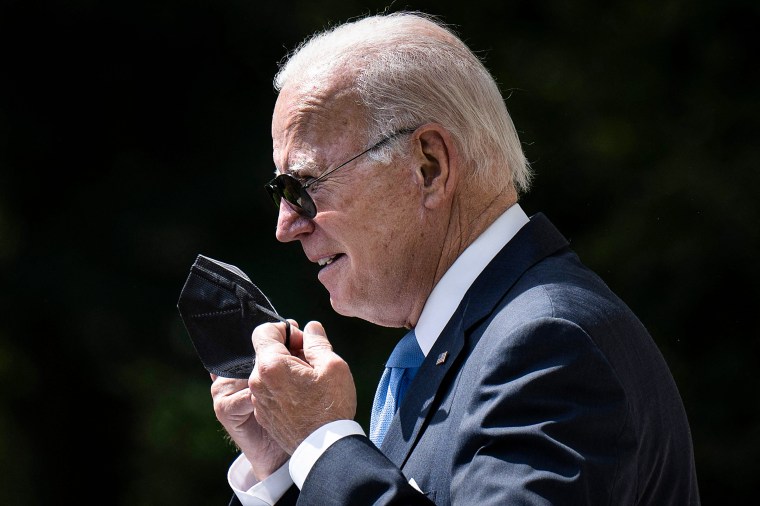President Joe Biden’s lingering Covid infection may have delayed his engagement in pushing his agenda’s momentum to midterm voters.
But fortunately for the White House, one major outside event served to clearly illuminate the pitch that a top Biden adviser tells NBC News will be the heart of his argument to voters this fall — one that sounds a lot like his winning message in 2020.
The resounding vote in Kansas to preserve abortion rights in the deeply red state was not just a cause for celebration at the White House, but validation for a Biden team that drew significant criticism for responding to the Supreme Court’s Dobbs decision by urging the nation’s voters “to make their voices heard” on abortion rights.
“The president — he took a little bit criticism for it — but he’s been focused from the outset on how critical voting is going to be, and that the quickest way and the most effective way to deal with this issue is going to be at the ballot box,” a Biden adviser said. “He had a high degree of confidence that, given the opportunity, people were going to do that.”
Bottom line: The overwhelming turnout in Kansas was not a surprise to the White House, the adviser said, even if it was for others. A referendum coinciding with a slate of primary elections in Kansas mainly on the GOP side was “a pretty tough place to test this theory,” the adviser acknowledged.
But “the idea that the country was just going to sit back and watch a fundamental right, and a right that implicates not only the right to choose, but the right to privacy more broadly, I just think was a misreading of what was going to happen,” the adviser said.
“And so, alongside people’s concerns with the economy, there is a very strong sense in the electorate that what’s at stake in these midterms are fundamental rights and freedoms that the country has long believed in and has come to rely on.”
It’s an argument that sounds a lot like Biden’s declaration of the 2020 election as a “battle for the soul of the nation” — one the adviser did not dispute.
The economy will be a front-and-center part of Biden’s message, the adviser said, focused on how he’s working both to tackle an immediate crisis of rising costs, but also implementing a long-term strategy to grow the economy from “the middle out, and the bottom up.” Biden will also argue that Republicans “want the issue more than they want to solve it.”
“But he’s also going to speak to what he has from the moment he started his campaign for president, which is [that] the soul of America, the core values and freedoms and beliefs we have, they’re at stake too,” the adviser said. “He’s going to speak to how he believes that that there is a very strong majority, an overwhelming percentage of Americans who share what those core values and beliefs are. And they include the right to choose, they include the right to privacy, they include the right to vote.”
A Brief Engagement ...
Speaking of the 2020 campaign, then-Atlanta Mayor Keisha Lance Bottoms was a top surrogate for Biden throughout the Democratic primaries, and just joined the White House last month as a senior adviser leading the Office of Public Engagement. She replaced another 2020 stalwart, Cedric Richmond, who’d shifted over to the DNC after 15 months in the West Wing.
But it appears Bottoms’ tenure will be brief. A White House official confirmed that Bottoms serves under what’s called a so-called “Special Government Employee” status, defined as someone “employed by the Government to perform temporary duties, with or without compensation, for not more than 130 days.” Based on her July 1 start date, that means Bottoms is on track to depart as soon as November 8.
A White House official said Bottoms will serve through the midterm elections, and could stay longer. And there’s precedent. Anita Dunn, who returned to the West Wing full time this spring, started her tenure last year as an “SGE” as well — staying about two months longer than the prescribed 130 days.
... And a Long Estrangement
After testing positive for COVID on July 21 and then suffering a “rebound” case last week, Biden has spent most of the last two weeks in isolation — including from the First Lady. A source close to the First Couple said no one can remember a stretch as long as the 18 days that Joe and Jill Biden have been apart, at least as far back as his time as vice president. The couple have spoken often, though, mostly by phone but also via FaceTime. They are scheduled to travel together to Kentucky on Monday to visit with those affected by devastating flooding.
Garcetti remains in limbo
While the Senate was waiting for final terms of the Inflation Reduction Act to come together this week, the confirmed a slate of Biden ambassadorial nominees — more than a dozen, in fact, including National Security Council chief of staff Yohannes Abraham, who we wrote about in January, to represent the U.S. at ASEAN.
The Senate often clears a backlog of mostly uncontroversial nominations before a long recess, as they similarly did before the holidays last December. But it often serves to spotlight those that remain controversial, as in this case with Los Angeles Mayor Eric Garcetti, Biden’s pick to be ambassador to India.
Garcetti, whose nomination has been pending before the full Senate since January, has made multiple trips to D.C. of late in hopes of securing enough Democratic support to win confirmation. But the lack of action to this point means his only remaining hope might be in a lame duck session.

